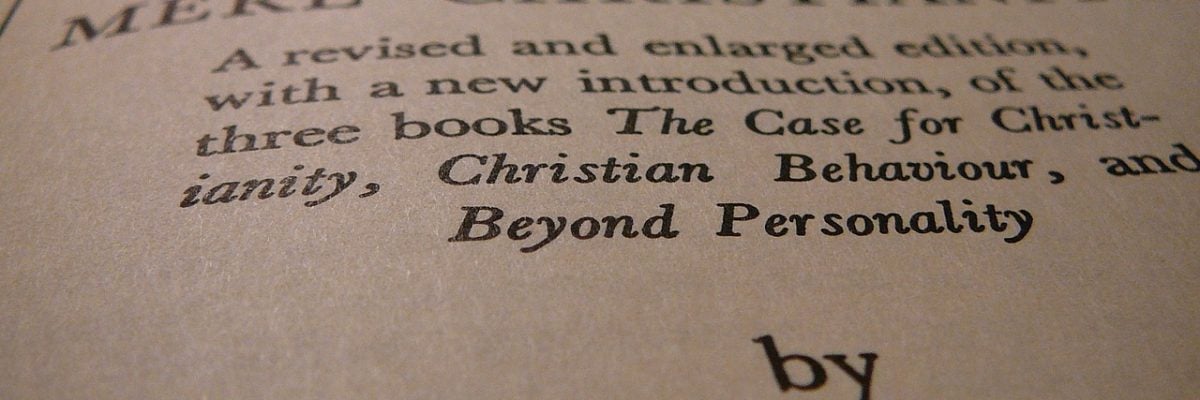
Clive Staples Lewis was undoubtedly one of the greatest Christian apologists of the twentieth century. Although he never became a Catholic, Lewis’s writing was “Catholic-friendly” in important ways. He espoused eucharistic realism, a male ministerial priesthood, and auricular confession, among other things. And although Lewis’s exposition of a basic or “mere” Christianity is not without issue (How many items constitute the basics? Who gets to decide this?), Lewis produces a powerful array of arguments any Catholic defender of the Faith can use to draw others to the truth.
One of Lewis’s most powerful arguments in Mere Christianity is his first one: what the existence of a universal moral law implies about the existence of God.
Lewis begins with a seemingly off-topic statement: “Everyone has heard people quarreling.” He gives examples of things people say when they feel they have been mistreated: “How’d you like it if anyone did the same to you?” or “Come on, you promised.” Lewis notes:
What interests me about all these remarks is that the man who makes them is not merely saying that the other man’s behavior does not happen to please him. He is appealing to some kind of standard of behavior which he expects the other man to know about. And the other man very seldom replies: “To hell with your standard.”
At this point, a twenty-first-century reader might note that Mere Christianity was derived from a series of BBC radio talks that Lewis gave between 1942 and 1944. Such an argument might have worked then, one might say, but the objection “To hell with your standard” is exactly what the average person on the street might say today. After all, we now live in what Pope Benedict XVI famously dubbed the “dictatorship of relativism,” where objective, universal truth is said not to exist.
Of course, “There is no objective truth” is itself a truth-statement. Proponents of this view think they are correct, that their view is true. We simply can’t get away from this idea of truth, can we?
This is why no one actually lives this way. In his book The Reason for God, the influential Presbyterian pastor Tim Keller notes:
Conservative writers and speakers are constantly complaining that the young people of our culture are relativistic and amoral. As a pastor in Manhattan I have been neck-deep in sophisticated twenty-somethings for almost two decades, and I have not found this to be the case. The secular, young adults I have known have a very finely honed sense of right and wrong. There are many things happening in the world that evoke their moral outrage.
Don’t forget that Lewis was aware of moral relativism in 1940s England, too. Such ideas were already in vogue in the academy, if not on street level. He may have had many of his Oxford colleagues in mind when he wrote,
But the most remarkable thing is this. Whenever you find a man who says he does not believe in a real Right and Wrong, you will find the same man going back on this a moment later. He may break his promise to you, but if you try breaking one to him he will be complaining ‘It’s not fair’ before you can say Jack Robinson. A nation may say treaties do not matter, but then, next minute, they spoil their case by saying that the particular treaty they want to break was an unfair one. But if treaties do not matter, and if there is no such thing as Right and Wrong—in other words, if there is no Law of Nature—what is the difference between a fair treaty and an unfair one? Have they not let the cat out of the bag and shown that, whatever they say, they really know the Law of Nature just like anyone else?
It seems, then, we are forced to believe in a real Right and Wrong.
So, what’s the ultimate point here?
Lewis wants his audience to understand three facts:
1. There is a universal moral law, which applies to everyone. Whether or not people explicitly believe in such a thing, they appeal to it all the time—complaining that they’re the victim when someone else doesn’t obey it, and attempting to excuse themselves when they don’t obey it personally. This leads us to Lewis’s next point.
2. All of us are, have been, or will be breakers of this moral law. We all sin. Only the delusional or those who never examine their consciences would deny this.
3. The existence of this universal, moral law strongly implies a moral law giver (which we would call God, but we’re not quite there yet).
Now, as Lewis adds later, we are “not yet within a hundred miles of the God of Christian theology.” This last point is still far from providing sufficient evidence for the Judeo-Christian concept of God, or the divinity of Christ. But it’s a potential starting point for belief in God, and that’s why Lewis leads off Mere Christianity with this argument. It’s also a starting point you and I can use when attempting to engage secular people in discussions about ultimate reality: a universal moral law exists, which in turn strongly implies the existence of God.



